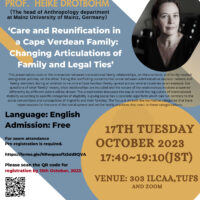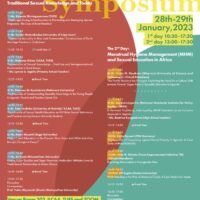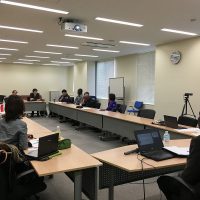2018年8月、ブラジルにて開催された国際人類学民族科学連合(International Union of Anthropological and Ethnological Sciences, IUAES)にて日本人研究者とウガンダ人研究者によるパネルが組織され、発表がなされました。
OP 061. Diversification and reorganization of ‘family’ and kinship in africa: Cross-cultural analysis on economic discrepancy, conflicts and potential of indigenous institutions for social security’.
The convenor is Mr. Chris Opesen (Makerere Univ, Uganda) and Wakana Shiino (ILCAA, TUFS, Japan)
https://www.inscricoes.iuaes2018.org/trabalho/view?ID_TRABALHO=495
Session
19/07/2018 – 08:30 – 10:00
Local: UFSC – CSE, bloco B, segundo andar, sala 201 / Block B, 2nd floor, Room 201
Reorganizing ‘family’ to keep security and pursuit livelihoods in exile: The case of South Sudanese refugees in Uganda – (Isao Murahashi 村橋勲) – Japan
This presentation aims to reveal how displaced people secure their livelihoods by maintaining, expanding, and transforming ‘family’. Uganda has a long history of hosting refugees from neighboring countries. It witnessed a large influx of South Sundanese refugees after the outbreak of armed conflict in 2013. South Sudanese have formed highly mobile societies due to their repeated displacement over decades. The married male plays a crucial role as family head in South Sudan. Here, I attempt to show the various coping strategies that South Sudanese adopt in exile, through several ‘family’ cases collected during ethnographic fieldwork in Ugandan Refugee Settlement. The loss of the family head, therefore, brings a sense of grief and lack of support to the bereaved. Refugees are entitled to receive food and non-food items as well as arable land in humanitarian aid, while they are chronically lacking and insufficient. Many young refugees who lose their caregivers manage to ensure safety and maintain food security within fictive families composed of their friends, kinsfolk, or tribal members. Some refugee families adopt the dispersal and division of family members as coping strategies to diversify their livelihoods and increase access to education and other services.
The Elderly, Spiritualism and Social Power Among Buhororo Tribal Societies in Uganda – (Ian Karushigarira イアン・カルシガリラ)
In this study, I will focus on the Bahinda- an African tribal society of Buhororo in Uganda and try to figure out the condition, conceptual issues and existence of the elderly in the contemporary society by following their narrative history from the pre-colonial era to modern times. I interest the academia with the fascinating elderly image construction, perceptions and opportunities associated with “being elderly”.
From this analysis, we will note that, presently, though the elderly people are minimally accorded respect especially on social functions like burial ceremonies, marriage and other rituals, they no longer have the spiritual and social power that they previously possessed. However, the evidence of the elderly’s legitimacy and spiritual power still resides in the communities through the symbolic role that the “image of elderliness” plays in witchcraft practices and related traditional and cultural beliefs in modern Uganda. Along, in a peculiar manner, we explore the image construction and associated spiritual role of the “elderliness” in modern Uganda.
Also, the gender roles as played by the elderly from traditional narratives will be expounded to bring to light the socio-economic welfare of the elderly and the evolving state of events in African societies that once cherished “elderliness”.
Interestingly, the undesirable loss of the legitimate image and situation of the elderly, has advantaged a wave of usage of “image of elderliness” as a market commodity among young people to whom superstition and witchcraft still remain undoubtedly a valued source of happiness and sorrow, death and life.
The Social Experiences of Husbands to Non-FGM Women: Potential African Insights from the Pokot Family Set-Up – (Opesen Chris Columbus オペセン・クリス・コロンブス) – Uganda
The paper explores the unique experiences isolated cases of men that marry women not initiated to womanhood through female genital modifications (FGM) in the East African Pokot family-set up live with. Evidence presented is based on life stories of husbands to non-FGM women, hermeneutics as well as interviews and group discussions ethnographically conducted with elders, women and technocrats from February 2015 to March 2016 at the Amudat district Pokot Kenya-Uganda border. Data analysis and interpretation were inductively and thematically conducted.
A prepuce in Pokot is believed to be unclean. A man who marries a woman who has not undergone FGM therefore, also becomes unclean. Contact with him in the same way, it follows, spells catastrophe to his entire family and society. For risk aversion thus, the Pokot observe a set of taboos. For instance, such a man cannot: (1) come in contact cattle (2) enter a family granary (3) have members of his age grade come to his home (4) sit at the fire place at the centre of the home (apirit) that also serves as the family’s security high command (5) appear in the graduation ceremony for rites of passage to manhood (sapana) and lastly, (6) speak in a gathering of initiated men. As a result of these taboos, the lived experience of men married to non-FGM women in Pokot is characterised by (a) admonishiments (b) status reversal and (c) marginalisation to the periphery.
In conclusion therefore, community worldviews on marriage worth, readiness and purity shape not only definions of what acceptable marriages are but also taboos and sanctions that follow deviance for risk aversion.
Session
19/07/2018 – 10:30 – 12:00
Local: UFSC – CSE, bloco B, segundo andar, sala 201 / Block B, 2nd floor, Room 201
Transformation of Marriage and Kinship among Nuer Refugees in Uganda: Rethinking the Potential for Reorganization of the Community – (Eri Hashimoto 橋本栄莉) – Japan
This paper describes the dynamics and various forms of Nuer marriage and kinship among refugees and migrants in Uganda by examining elements that define and recreate these Nuer concepts. Some self-help associations exist among the Nuer in Uganda, and they play important roles as arbitrators of customary Nuer norms and values. From case studies, we found that even though bridewealth is no longer paid in cattle, they still describe their marriages and new social ties using idioms related to cattle. The roles of traditional authority and customary law are also significant in reinterpreting indigenous ideas on marriage and unite kingroups who are away from their homeland. Practices to avoid incest suggest that fears regarding blood impurity are seen as a greater threat than ever. In the Nuer modes of cultural transformation, there are core notions to organize change, such as the Nuer concept of ‘blood’ (riɛm). From these core concepts, they select some other elements to strengthen them in particular contexts. Forced migration is not necessarily a destructive factor for the Nuer kinship/family system or cultural ideas, but an opportunity for the Nuer to rethink kinship/family relations in a new community.
African potentials and changing notions of family: Child fostering among the Herero people in Namibia – (Yumi Kamuro 香室結美)
The Herero people in Namibia possess a double unilineal descent system, and their matriclan is called ‘eanda’. Herero people, especially ‘grandmothers’, foster the children (okuvera omuatje) of the relatives who belong to the same eanda and raise them as if they were their own children. The matriclan members claim they exchange their children with each other to keep their family tight. However, the younger generation more frequently choose raising their children by themselves. Based on a case study of the movement of children from biological parent(s) to foster parent(s) within an extended family, this presentation will illustrate 1)the possibility of raising children by multiple “parent(s)” and 2) changes in the idea of family in the Herero society.
Diversification of “Family Care” for Elderly Women in Rural Kenya : Consideration of Potentials beyond “Family” – (Kaori Miyachi 宮地歌織) – Saga University
Aging is a global phenomenon all over the world, including sub-Saharan African countries. In Kenya, according to the UN Report on World Aging Population 2015, elderly over 60 consist of 4.5% of the population in 2015 and it is estimated to reach 13.4% by 2030. In addition, UNFPA Report (2012) mentions that women are more vulnerable in terms of regarding health, economic status, and safety than men, especially in developing countries. The main purpose of this study focusing on elderly women in rural Kenya is to understand their current way of living.
The Open panel we convened in IUAES Academic congress (Open Panel no. OP 61) addressed a diversity and heuristics concerning the cross-cultural analysis of diversification and re-organization of family in Uganda, Kenya and Namibia. Topical discussions ranged from the studies of gerontology (tackling the cultural and well as development issues concerning aging) to the issues of refugees and citizenship, sexuality (Female Genital Modification) and adoption.
The open panels attracted reactions and discussions on these thematic topics. Indeed, these areas of research are very relevant to the academia in this period of rapid transformation globally, nationally as well as at societal and family level.
Thanks to Kaori Miyachi, Isao Murahashi, Chris C. Opesen, Eri Hashimoto, Ian Karusigarira and Yumi Kamuro for your tremendous contribution to this successful representation.
 en_US
en_US ja
ja





